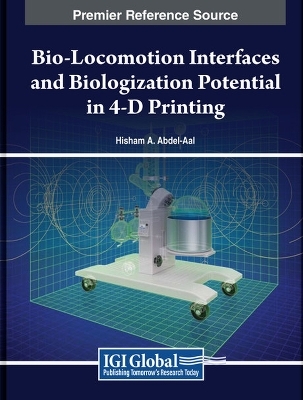
Bio-Locomotion Interfaces and Biologization Potential in 4-D Printing
Seiten
2024
IGI Global (Verlag)
978-1-6684-5638-5 (ISBN)
IGI Global (Verlag)
978-1-6684-5638-5 (ISBN)
A comprehensive solution to the challenges faced in biomimetic surface design. The book addresses the need for a new surface design methodology, emphasizing the importance of generating bio-inspired functional surfaces in MESD. It delves into the core of design generation, emphasizing the implementation of design rules.
In the evolving market of product design, the optimization of surface patterns is a crucial factor in determining the functionality of future products. However, despite numerous surface designs introduced in recent years, the field remains significantly underdeveloped. The absence of systematic and well-defined methodologies for generating deterministic topologies has turned the design of surfaces into more of an art than a precise science. This deficiency is further exacerbated by a dominant design culture that attempts to tame nature rather than establish harmonious coexistence within the Man Engineered Systems Domain (MESD). The challenge lies in the lack of a holistic surface design methodology that can merge function, form, and topography to produce optimized constructs capable of efficient operation within an envelope of constraints. Bio-Locomotion Interfaces and Biologization Potential in 4-D Printing is a comprehensive solution to the challenges faced in biomimetic surface design. This groundbreaking book recognizes the underdeveloped state of the field and proposes a trans-disciplinary approach that seamlessly integrates engineering, physics, and biology. It addresses the need for a new surface design methodology, emphasizing the importance of generating bio-inspired functional surfaces in MESD. Unlike existing approaches that rely on mere bio-mimicry, this book delves into the core of design generation, emphasizing the implementation of design rules rather than the replication of natural constructions. It is the ultimate guide for scholars seeking to bridge the gap between biology and engineering and acquire the methodologies needed to deduce design rules and construct deterministic surfaces inspired by bio-analogues. The book systematically navigates through the fundamentals of surface metrology, the elements of surface design on natural surfaces, and the implications for surface customization. Each chapter is meticulously crafted to provide scholars with a solid foundation, covering topics from thermodynamics and friction to the customization of surfaces for friction and the potential of bio-inspiration in additive manufacturing. Bio-Locomotion Interfaces and Biologization Potential in 4-D Printing is not just a book; it is a roadmap for academic scholars, offering a transformative journey where art meets science, and nature harmoniously coexists with engineering ingenuity.
In the evolving market of product design, the optimization of surface patterns is a crucial factor in determining the functionality of future products. However, despite numerous surface designs introduced in recent years, the field remains significantly underdeveloped. The absence of systematic and well-defined methodologies for generating deterministic topologies has turned the design of surfaces into more of an art than a precise science. This deficiency is further exacerbated by a dominant design culture that attempts to tame nature rather than establish harmonious coexistence within the Man Engineered Systems Domain (MESD). The challenge lies in the lack of a holistic surface design methodology that can merge function, form, and topography to produce optimized constructs capable of efficient operation within an envelope of constraints. Bio-Locomotion Interfaces and Biologization Potential in 4-D Printing is a comprehensive solution to the challenges faced in biomimetic surface design. This groundbreaking book recognizes the underdeveloped state of the field and proposes a trans-disciplinary approach that seamlessly integrates engineering, physics, and biology. It addresses the need for a new surface design methodology, emphasizing the importance of generating bio-inspired functional surfaces in MESD. Unlike existing approaches that rely on mere bio-mimicry, this book delves into the core of design generation, emphasizing the implementation of design rules rather than the replication of natural constructions. It is the ultimate guide for scholars seeking to bridge the gap between biology and engineering and acquire the methodologies needed to deduce design rules and construct deterministic surfaces inspired by bio-analogues. The book systematically navigates through the fundamentals of surface metrology, the elements of surface design on natural surfaces, and the implications for surface customization. Each chapter is meticulously crafted to provide scholars with a solid foundation, covering topics from thermodynamics and friction to the customization of surfaces for friction and the potential of bio-inspiration in additive manufacturing. Bio-Locomotion Interfaces and Biologization Potential in 4-D Printing is not just a book; it is a roadmap for academic scholars, offering a transformative journey where art meets science, and nature harmoniously coexists with engineering ingenuity.
| Erscheinungsdatum | 02.03.2024 |
|---|---|
| Verlagsort | Hershey |
| Sprache | englisch |
| Maße | 216 x 279 mm |
| Themenwelt | Naturwissenschaften ► Chemie ► Technische Chemie |
| Technik ► Maschinenbau | |
| ISBN-10 | 1-6684-5638-9 / 1668456389 |
| ISBN-13 | 978-1-6684-5638-5 / 9781668456385 |
| Zustand | Neuware |
| Informationen gemäß Produktsicherheitsverordnung (GPSR) | |
| Haben Sie eine Frage zum Produkt? |
Mehr entdecken
aus dem Bereich
aus dem Bereich
Grundlagen, technische Anwendungen, Rohstoffe, Analytik und …
Buch | Softcover (2023)
Springer Vieweg (Verlag)
CHF 55,95
erneuerbare Energien und Speichertechnologien für die Energiewende
Buch | Softcover (2023)
De Gruyter Oldenbourg (Verlag)
CHF 97,90


